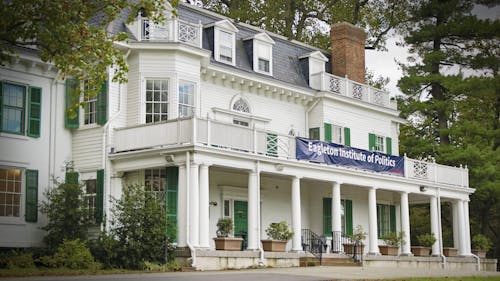Rutgers' Eagleton Institute of Politics launches new database to show number of scientists in US politics

The Eagleton Institute of Politics launched a new database on Monday that displays the presence of scientists in U.S. politics, according to a press release.
This database was created through Eagleton’s Science and Politics Initiative and is the first publicly accessible national database of its kind, according to the release. It specifically shows elected state legislators who have scientific, engineering and health care training.
“As our nation continues to face the pandemic, climate change, renewable energy infrastructure and other science-based issues, it becomes apparent that the perspectives of scientists who hold elected office are invaluable,” said Anna Dulencin, senior program coordinator of the Eagleton Science and Politics Initiative.
The database shows that approximately 3 percent of state legislators throughout the U.S. are scientists, engineers or health care professionals, with New Hampshire, Georgia and Texas having the highest numbers of these professionals in their legislatures, according to the release. New Jersey currently has three scientists, one engineer and four health care professionals in its legislature.
Additionally, the database displays that health care professionals are the most represented in state legislatures out of the three professions, with approximately 197 individuals, while scientists and engineers each have 20 and 11 individuals respectively, according to the release. Most members of these professions are white and male, with a majority of health care professionals and engineers being Republicans, and most scientists being Democrats.
The ongoing coronavirus disease (COVID-19) pandemic has demonstrated the need for developing better communication and understanding between elected officials and scientists, Dulencin said, according to the release.
“Addressing almost any issue — from facial recognition usage and automated vehicles to wildfires, superstorms and the many ramifications of pandemics — requires policymakers at all levels of government to quickly make critical decisions that are informed by increasingly complex scientific data and understanding,” she said.
Dulencin said the database was designed with the help of student Zaynab Khan, a School of Arts and Sciences senior, according to the release.
John Weingart, associate director of Eagleton, said the database will provide a variety of individuals with free access to this information, and will be updated when new data becomes available as well as after each general election, according to the release.
“The Eagleton (Science and Politics Initiative) explores how a deeper understanding across the disciplines of science and politics can benefit policymakers, scientists and the larger public,” he said. “Researchers, reporters and interested members of the public can use this tool to look for correlations between innovative science policy at the state level and the number of scientists who are elected to the state legislature.”



